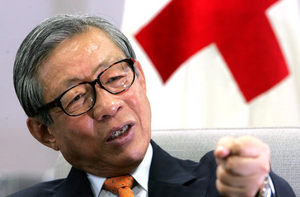Posted on : Aug.24,2006 14:27 KST
Han Wan-sang, President of the Korea Red Cross
Under an agreement made at inter-Korean Red Cross talks this spring, the South’s Red Cross sent pharmaceuticals and medical equipment to its counterpart in the North to help modernize the Red Cross hospital in Pyongyang. During my stay there, I met Kim Young-nam, chairman of the North’s Supreme People’s Committee. Because I had met Kim several times before, we can share sincere discussions. Though our meeting was not long, Kim emphasized the importance of the June 15, 2000 Joint Declaration. I also gave my opinions and he listened carefully.
Most importantly, I told him that the June 15 Declaration was a watershed moment for our people. One reason is that inter-Korean exchange took on a significantly different shape after the declaration. The combined trade volume between the two Koreas from 2000 to 2005 stands at 1.9 times more than the figure from the entire period between 1948 and 2000. During that five-year period, the number of people who met with separated family members on either side of the DMZ jumped more than 100 times than the number of meetings during the prior 52-year period. So I said to Kim Young-nam that the June 2000 was a watershed point; he was surprised by the figures.
While we picked the June 4 Joint Statement in 1972 and the basic agreement in 1992 as important inter-Korean agreements, no top leaders from the two Koreas directly signed the two documents. The June 15 Joint declaration is the only document directly agreed to and signed by two leaders from the two Koreas. As such, the declaration could be a role model for inter-Korean collaboration. To implement this collaboration, I stressed to Kim Young-nam that it is time for the North’s leader to visit the South. And, the more the two Koreas face difficult tasks, the better it is for the two leaders to meet in person to share frank discussions.
For now, North Korea is emphasizing inter-Korean cooperation. If the cooperation materializes, two conditions should be met: more organic cooperation, and consistency.
A more organic cooperation between the two Koreas can be met when we discuss problems that may threaten our security and safety. At this time, our most significant security threat is North’s nuclear problem. So, I told Kim that Pyongyang should talk with Seoul, instead of sticking to bilateral talks with Washington. In response, Kim looked like he felt a sense of inconvenience.
Consistency involves constant dedication to improving inter-Korean cooperation. If talks are held only under conditional terms, it may be difficult for cooperation to last. Talks may be called off unpredictably. To continue with dialogue, we should place value on cooperation beyond self-interest. Under an interest-based relationship, during good times we will give the amount that we received, but during difficult times there will be a vicious cycle of “an eye for an eye, a tooth for a tooth." Power to sustain true cooperation means an attitude of giving more while receiving less. Therein lies the humanitarian spirit.
This summer, we suffered from flooding. Nevertheless, we decided to send 100,000 tons of rice and recovery equipment to the North’s people, who were suffering from worse damage than we were. At first glimpse, some people may think of that aid as a naive gesture. However, if this kind of humanitarian decision helps to improve inter-Korean relations, if it allows us to become closer to peace, it will be a priceless act of sharing for the long-term reconciliation of our people. Don’t you think that the fruits of peace are the best gift for our next generation?






